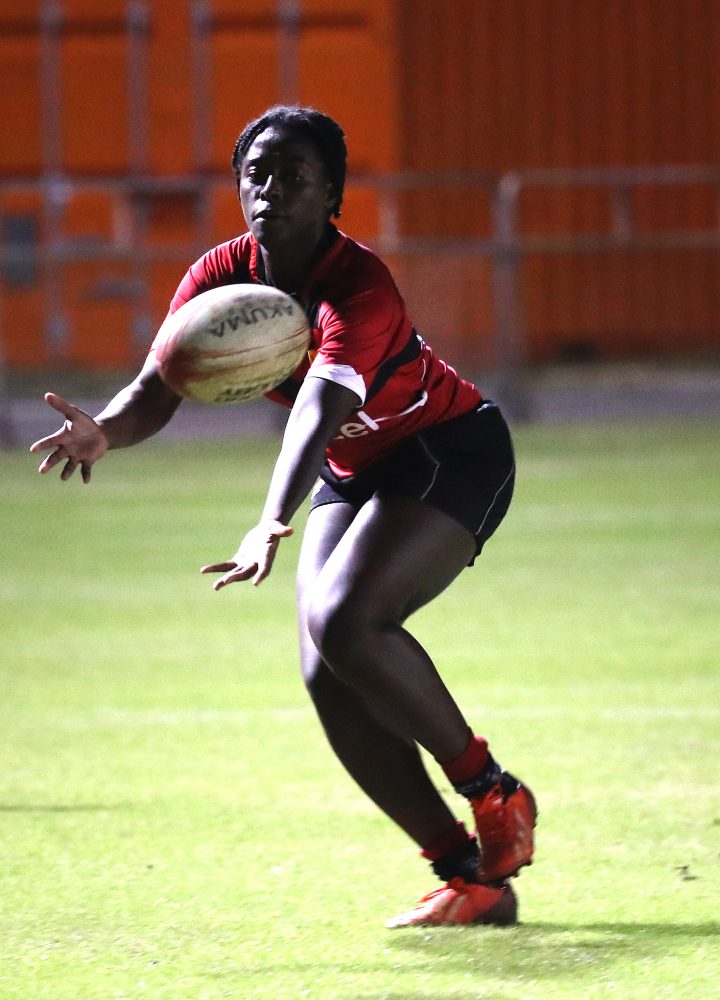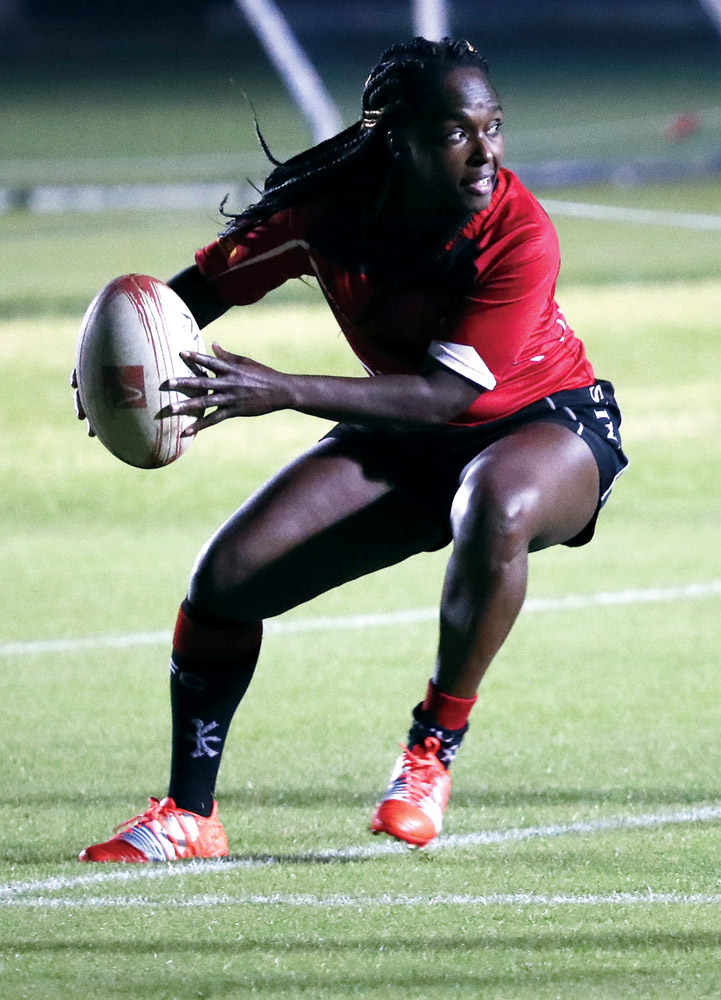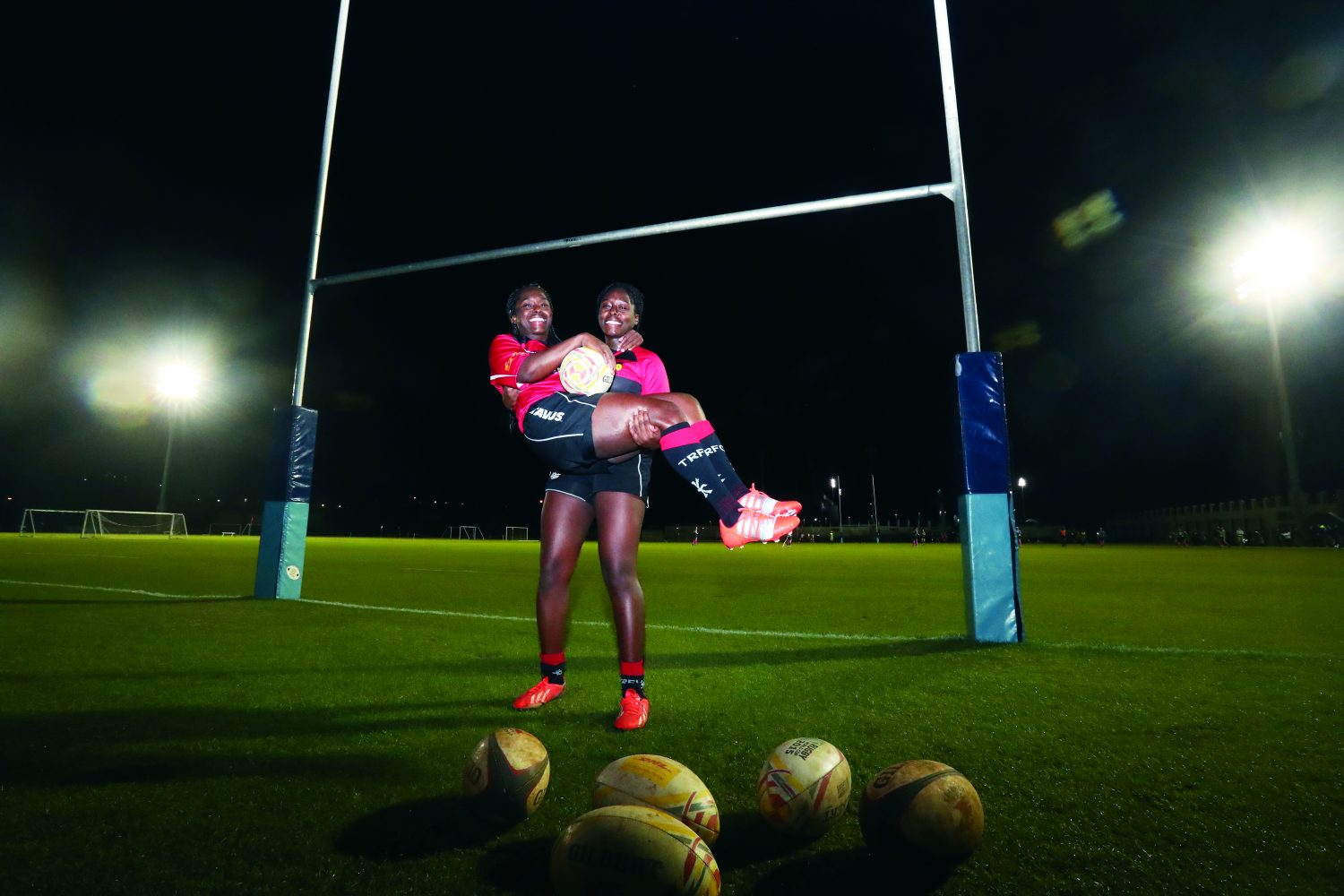In a year when Bermuda’s athletes made headlines around the world, Gillian Cross and daughter Corrie Cross largely slipped under the radar of the island’s collective consciousness.
Teammates, some-time roommates, friends, mother and daughter, the pair are far from being household names, and women’s rugby, their chosen sport, is still struggling for recognition in the wider community, but they have achieved something no other athletes, Bermudian or otherwise, have managed before. In November the Cross women became the first parent and child combination to play in the same international team in any sport when they represented Bermuda at the Rugby Americas North Sevens in Trinidad.
Family success in sport is nothing new; it is evident in almost any sport that you could care to mention. Siblings have won World Cups together, parents have won Olympic medals, only for their offspring to win their own years later, and every weekend of the year parents and children compete together in a variety of disciplines around the world, but before November a parent had never played in the same team as their child on the international stage.
Neither was this some minor tournament in an outlying province of the game. There were big teams, including Canada, the Olympic bronze medal-winners, involved, and big prizes, such as a place at this year’s Hong Kong 7s, at stake.
This historic achievement, while undoubtedly special, does not define the pair, or their relationship, which is of the sort that many parents might hope to have with their children. It is evident from speaking to them at Gillian’s office at XL Catlin that they are teammates first. “I have to remind her that I’m her mother sometimes,” she says.
Corrie does not let that remark go unchallenged. “Day One, the first day I started playing…her nickname is Shine [Gillian cuts in: “I’m a diamond, I shine”]….she came to me and said ‘OK Corrie, don’t call me mom, my name is Shine, I will not answer if you call me mom’. I was like ‘are you serious?’ and she said ‘call me Shine’.
“I tried to call her mom, did not work. OK, fine, but it stuck and at home I don’t really call her mom that often, unless I really, really want something. Nine times out of ten she’ll respond if I say Shine; she usually doesn’t respond if I say mom. So, it’s got to the stage where we’re friends first; obviously she’s my mom.”

As you might expect Corrie did eventually call Shine “mom” at training, which came as a shock to the pair’s teammates. “We hadn’t told everyone from the get-go that [she was my mother],” Corrie says. “They knew we knew each other and were somewhat related, but I never said ‘that’s my mother’.
“We were in a rookie game for touch and I said ‘Oh, mom’, and someone started freaking out because they thought we were sisters. It was really funny and happens every so often.”
Gillian chimes in: “It was my moment, I was working it for a while. I’m not a mother, I’m a rugby player, and I’m fast like everyone else.”
- * * *
It was Gillian that brought rugby into the Cross family.
After 20 years in Bermuda and having little participation in the way of team sports under her belt, Gillian got involved with the Teacher’s Rugby Football Club women’s touch team towards the end of the 2012-2013 season. Well into her Thirties at that stage, she found herself bitten strongly by the rugby bug and signed up for the national women’s contact team in March 2014, encouraged to do so after her aggression during touch rugby caught the eye of a Bermuda player.
“I fell in love with rugby as soon as I started with touch, the training,” says Gillian, whose speed naturally translated into a position on the wing. “I didn’t really do a sport [before]. I worked out independently, went to the gym, went running, and didn’t really participate. This was my first example of playing in a team.”
Her daughter’s experiences with sport were much the same, except that Corrie tried rugby when she was young and did not take to it, much like the other ones she took up, and set down soon after. She tried rugby again several years later at her mother’s suggestion and this time something clicked. “With rugby something was different, the tactical concept [appealed], and ‘how am I going to get past [the opposition] using my team-mates’? I guess maybe because I was with my mom and she was enjoying it so much, I thought I could do it too and enjoy myself,” Corrie says.
For Gillian her daughter’s love affair with rugby was an “ah-ha” moment, an occasion when her job as a parent to instill a desire for an active lifestyle in her daughter was done. The history-making nature of their relationship is largely secondary in Gillian’s mind, and she does not consider herself and her daughter to be trail blazers. “For me I would like for everyone to see that you’re never too old, and you’re never too young, to take up some sport and love it,” she says.

“For mother, daughter, father, son, to do it [sport] together is just the icing on the cake. For us, my husband [Cory Cross] is very involved. He’s the guy that makes our dinner when we come home from training, it’s a family affair, and it will make a stronger family bond if more people see us and say ‘these guys are doing it’. Strong family, strong players, it makes for a healthier relationship all around, and a better community.
“I don’t know if a lot of people know much about our story, and what we do. I sing it all the time. I talk about rugby all the time, and some of the other parents have said they don’t know how I do it, but I just tell them to try it.
* * *
When looking at their relationship the obvious question that comes to mind is whether Corrie and her mother would be as close if they didn’t play rugby together. It is one that Corrie is unsure how to answer, especially as it means acknowledging the personality traits the pair share. “Our personalities are very hard headed, when we have butting opinions we tend to clash, but rugby has helped us to get over those,” Corrie says.
“I’m sure we would have found a way; rugby made it easier. It’s like that in rugby, you might not get along with a person but you have to figure it out because you’re not the only two on the pitch. You don’t have to be friends, but you have to work with each other. But she’s my friend.”
That’s not to say that they pair do not clash on occasion, but training, specifically the contact training, allows for the release any of the pent-up tension that normally arises in any mother-daughter relationship. Gillian is not a big fan of training against her daughter because “she hits hard”; Corrie, who describes herself as a utility player, sees this opportunity to tackle her mother as cathartic in many ways.
“I feel like we’re closer because we can hit each other….subconsciously, in a shady way, get out any tension we have between each other,” Corrie says. “I just tackle her on the pitch and work it out.”
As teammates the pair work together in training as other players would, something Corrie believes has ultimately made the bond between them far stronger. “I think maybe because we play together our relationship is closer because I see her as my mom, but also my team-mate,” she says. “So, where someone else might go to another team-mate about personal stuff about boys, or whatever, it’s so easy to tell my mom because she’s there. I think we’re closer in that way.
“We motivate each other to work harder, and it’s nice to go home to have someone to talk to about training, and it’s just nice to feed back off of her. That back and forth between us helps me with my game.”
Clashes, when they come, are infrequent and largely worked out before the pair get home. By and large the frustrations of the day are left on the field, for both that release is a welcome one. “You play the best when you’ve had a stressful day, it’s amazing, and it shows because the coach is like ‘rough day?’ and I’m ‘yes, let’s just do this’,” Gillian says. “You play better I think.”
Despite the relationship on the field there are times when Gillian will revert to type, and the concerned parent will come to the surface. Primarily this occurs when the older Cross is on the sidelines and the younger one is playing on her own; it is a side of Gillian that often provokes amusement from her daughter.
“I was playing in an under-18 game and got a concussion that was pretty bad, and she was freaking out because she was watching from the sidelines,” Corrie says. “It’s weird how it switches. On the pitch she’s my teammate, she’s telling me to brush it [a hit] off, but when she’s off it’s a completely separate thing. It’s funny to see.”
* * *
Neither Gillian nor Corrie realised that walking on to the field in Trinidad would be a world first, a moment to forever etch their names in to the history books. In many ways it does not seem to have really sunk in. Gillian describes it as “a bit of a surprise,” her daughter comes across as being rather less impressed with the whole thing.
“It wasn’t a surprise, I was just playing with my mom,” she says. “I’ve heard of people playing with their parent before, but I didn’t realise…I’m sure it has been done before, but not on an international level.”
Still, the pair will cherish the time they do get to spend on the field together, with opportunities likely to dwindle rather than grow in the months and years to come. Corrie is heading to university this year, hopefully to study architecture, with Cardiff University top of her list; a choice driven by the quality of the women’s rugby team, among other things.
Gillian, meanwhile, is approaching her fourth decade, although she has plans to be playing alongside her daughter for a while yet. “I figure wherever she is I can always pack my boots and go and play, that’s my plan,” she says. “We’ll be playing forever. When I stop having fun, that’s when I’ll stop, and I don’t see that coming any time soon.”

